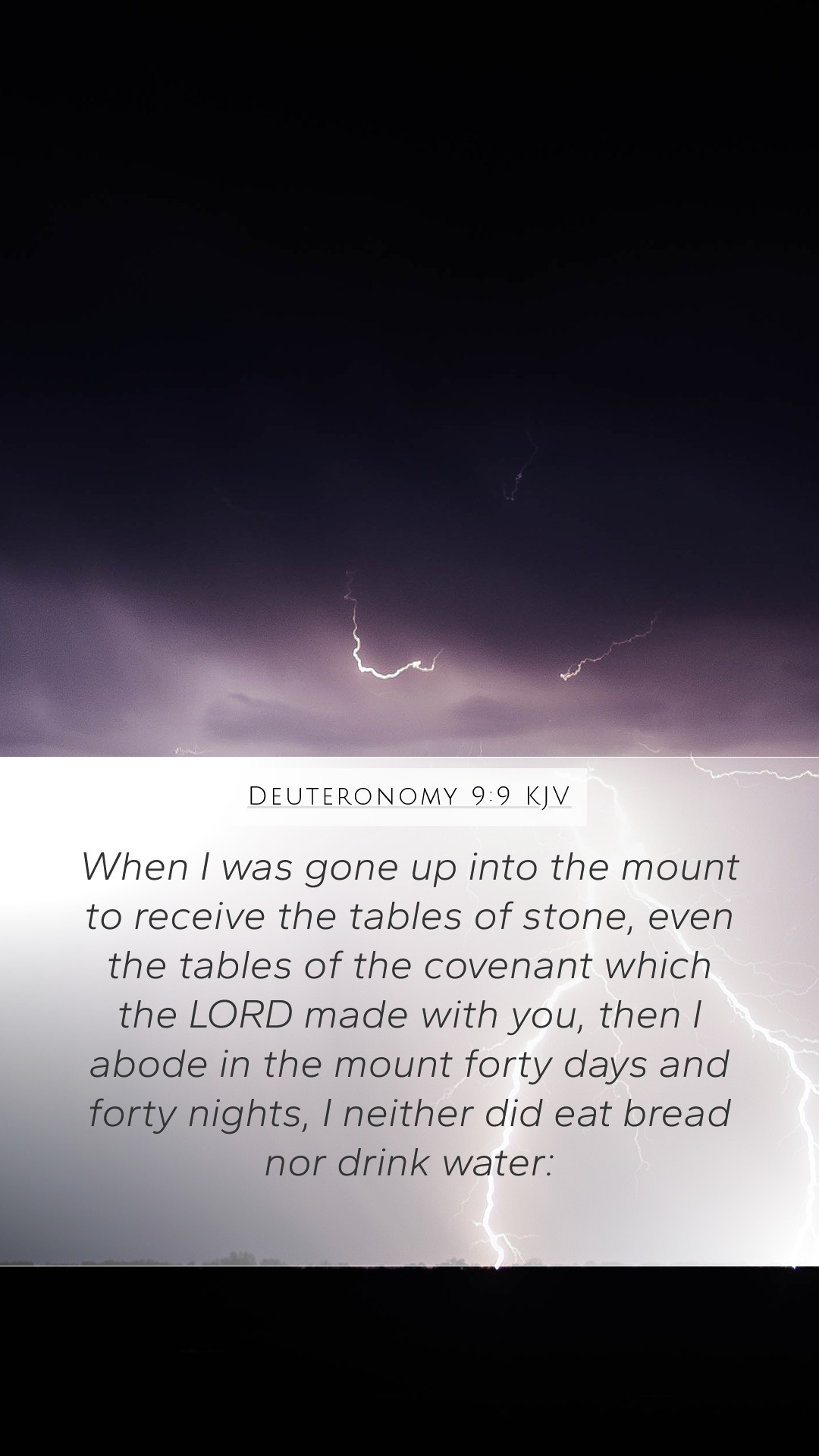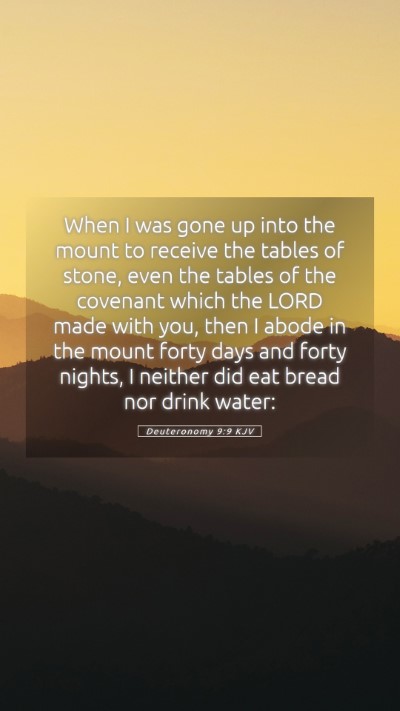Understanding Deuteronomy 9:9
Deuteronomy 9:9 states: "When I went up into the mount to receive the tables of stone, even the tables of the covenant which the LORD made with you, then I abode in the mount forty days and forty nights; I neither did eat bread nor drink water." This verse is significant, revealing the context of Moses' experience with God and the importance of the covenant He established with the Israelites.
Bible Verse Meanings
The meaning of this Bible verse can be explored through several lenses:
- Covenant Relationship: Moses acknowledges the covenant God made with His people, emphasizing the seriousness and weight of their relationship with Him.
- Divine Instruction: The directive to Moses to receive the tablets signifies divine instruction and law, fundamental for the nation's existence.
- Preparation and Sacrifice: Moses' fasting for forty days symbolizes preparation and sacrifice, reflecting the dedication required to engage with God's will.
Bible Verse Interpretations
Commentaries provide diverse insights into this verse:
- Matthew Henry notes that Moses speaks of his personal experience as a reminder of God's providence. He highlights the significance of the covenant and Moses’ unique role in mediating this relationship.
- Albert Barnes elaborates on the miraculous nature of Moses' sustenance during these days, pointing out how this instance reflects God's power and Moses' intimate connection with Him.
- Adam Clarke emphasizes the leadership of Moses, suggesting that his forty-day fast signifies a spiritual preparation for receiving the laws that would guide Israel's conduct.
Bible Verse Commentary
Various commentaries enrich our understanding of Deuteronomy 9:9:
- The context speaks of the Israelites’ rebellion, underlining the contrast between their unfaithfulness and God's unwavering commitment shown through the covenant.
- Moses' ascension to the mountain represents the transformative experience of receiving direct revelations from God, setting a precedent for spiritual accountability.
- The verse transitions to a plea for the Israelites to remember their covenant obligations, reiterating the necessity of obedience to God’s laws.
Scripture Analysis
In analyzing this verse, we should note:
- The Historical Context: Recognizing the setting during the Israelites' wandering in the wilderness aids our understanding of their struggles and spiritual needs during this period.
- Transformation and Empowerment: Moses transformed during these forty days, which symbolizes the empowerment of leaders through divine communion and instruction.
- Implication for Today: This verse invites reflection on the nature of one's commitment to God and the seriousness of His commandments.
Biblical Exegesis
Conducting a biblical exegesis on Deuteronomy 9:9 entails looking deeper into theological concepts:
- Covenant Theology: Fundamental for understanding the relationship between God and humanity, where God’s laws serve as a guide.
- Law and Grace: Tension between the law given to Israel and the grace offered through faith in Christ illustrates the continuity of God’s plan.
- Consequences of Disobedience: This verse sets the stage for later warnings about the repercussions stemming from the failure to uphold the covenant.
In-Depth Bible Verse Analysis
In-depth analysis of Deuteronomy 9:9 encourages theological reflection:
- The Significance of Forty Days: The number frequently appears in scripture, symbolizing periods of testing, preparation, and divine intervention.
- Miraculous Sustenance: Moses' ability to fast without food or water signifies divine intervention, paralleling Jesus' own forty days in the wilderness.
- The Role of Moses: As a mediator, Moses embodies the establishment of a priestly role, foreshadowing Christ's ultimate mediatorship.
Application of Bible Verse to Daily Life
This verse calls for practical application in various ways:
- Spiritual Dedication: The example of Moses teaches about the importance of dedicating oneself to God, whether through prayer, fasting, or study.
- Obedience to Covenant: Understanding the expectations stated in God's word encourages Christians to reflect on their own commitment.
- Seeking God's Guidance: Like Moses, believers are encouraged to seek God's wisdom before making decisions, prioritizing spiritual growth.
Cross References
Relevant cross-references include:
- Exodus 24:18 - Moses' time on the mountain receiving God’s law.
- Exodus 34:28 - Moses fasting and receiving the Ten Commandments.
- Numbers 20:6-13 - Further insights into Moses’ leadership and the people's disobedience.
Bible Study Insights
Through the lens of Bible study, Deuteronomy 9:9 offers rich material for discussion:
- Group Discussions: In Bible study groups, we can explore the significance of covenant keeping and what it means for our lives today.
- Online Bible Study Tools: Utilizing digital resources can enhance understanding of the historic and theological context of this verse.
- Bible Study Guides: Incorporating comprehensive guides in lessons can help unravel the deeper meanings of Scripture.
Final Thoughts
In summary, Deuteronomy 9:9 serves as a potent reminder of God's promises and expectations of His people. Engaging with this scripture opens pathways for deeper understanding and application in daily life.


